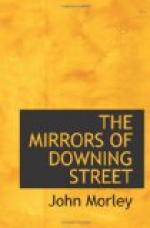Although a rather dull speaker, few men of my acquaintance were more lucid and convincing in conversation, particularly when he addressed a sympathetic mind. This was notably the case when he was unfolding his ideas on the conflicting theories of Individualism and Socialism. If his conversations on this head could be printed in a book they would make difficult work even for the most ingenious apologists of Socialism. He was persuaded that no theory of Socialism could be put into successful practice without involving the loss of personal freedom, and that without Individualism there would be no initiative, no audacity, and no creative energy in the development of an industry. Whenever he was in conflict with Socialists he would say to them, “Why don’t you buy me out and run the mines yourselves? You have plenty of money in your unions, and I am quite willing to sell.”
There were several strange and interesting movements in his otherwise quite simple and boyish nature. For example, he had no religious faith worth speaking about, certainly no dogmatic faith of any kind; but he always said his prayers. Then he held the theory that old age was a form of disease, and so avoided, as much as possible, the society of old people, fearing contagion; the young people with whom he loved to surround himself, and on whom he delighted to play many practical jokes, he called his “young germs.”
He was entirely free from all forms of snobbishness, and would make fun of titles and honours and ridicule aristocratic pretensions; yet he went somewhat painfully out of his way to get a title from his Party when he retired from the House of Commons, and was justly indignant at the way this bargain was broken by the Liberal leaders of that day. I think he wanted a title at that time chiefly to prove to his constituents that he had faithfully done his duty by them.
He seldom read a book of any account after he came down from Cambridge, but hardly a day of his life passed that he did not learn by heart a number of fine sayings which appealed to him in a book of quotations. These quotations he would fire off at his family till they cried for mercy, or another set.
He was far happier among his Herefords at Llanwern than in London or in Cardiff, but he was for ever postponing the day of his retirement from public life. He kept all his boy’s love for birds and animals, and had real feeling for beautiful things in nature; but the game of life drew him always towards the city.
At one time he smoked a prodigious number of cigars and drank a bottle of port every night, but about twenty years before his death he gave up both habits on the challenge of a friend and never reverted to them again. Mr. William Brace, the miners’ leader, said to me one day, “Rhondda has the income of a duke and the tastes of a peasant, whereas I have the income of a peasant and the tastes of a duke.” I told Lord Rhondda this, and he smiled quietly over the remark, saying, “He’s a very pleasant fellow, Brace: fond of pictures, and a good judge of them, too. Yes, I suppose my tastes are rather simple when you come to look at them, but I don’t find them cheap.” He was on excellent terms with Labour politicians, knew many of the old miners with real intimacy, and could handle large bodies of men with consummate tact.




